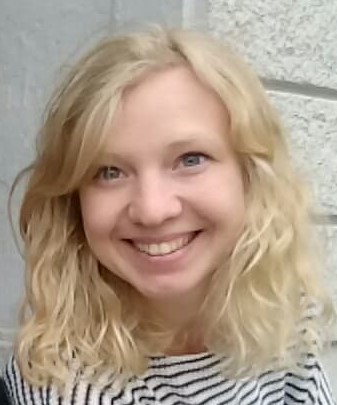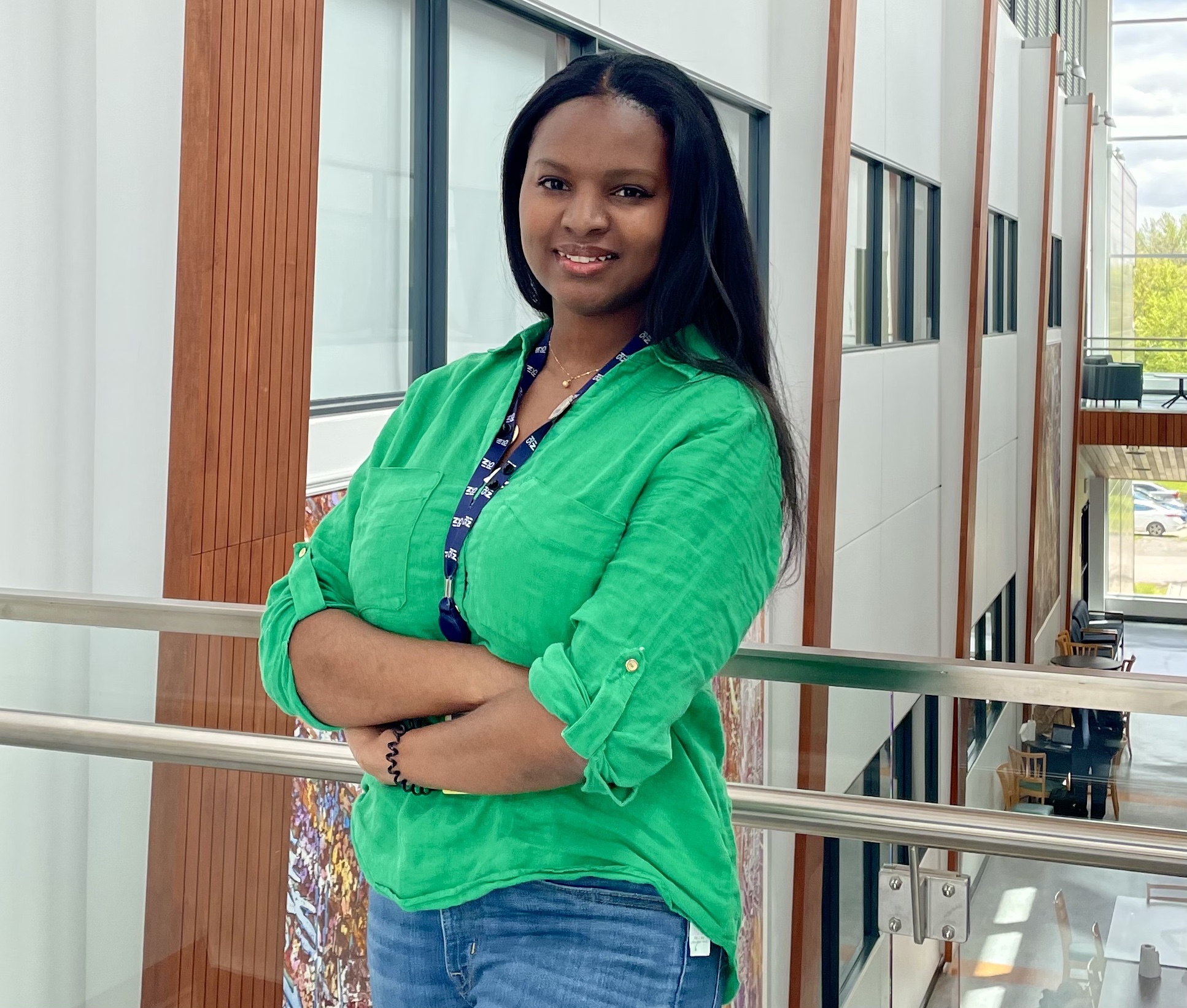Two scholarship winners who embody leadership and commitment
We are delighted to announce the winners of our new INRS Foundation Leadership and Commitment Scholarship. Students Apolline Maurin and Aïssatou Aïcha Sow fully embody the spirit of the scholarship: two leaders who make a concrete contribution to the vitality of the student community at the Institut national de la recherche scientifique (INRS).
Ms Maurin is a doctoral student in biology under the supervision of Professor Claude Guertin. She chose to follow this programme after obtaining an engineering degree, with a view to doing research and development in academia or industry. As well as her interest in science, she attaches particular importance to sharing and passing on knowledge, but also to creating a humane and caring environment. This is what led her to get involved in student associations and to volunteer for popularisation workshops.
Ms Sow is a doctoral student in virology and immunology under the supervision of Professor Laurent Chatel-Chaix. The pandemic prompted her to take advantage of her skills in popularising science to fight misinformation. Diversifying these popularisation activities has enabled her to reach out to different populations regardless of age, social status or level of education. Equity, diversity and inclusion are also particularly dear to her heart. Originally from Senegal, she created the JigeenInSTEM perseverance scholarship for young women with a passion for science, technology, engineering or mathematics. She funds the scholarship from the prizes she wins at her scientific conferences.
Congratulations to Ms Sow and Ms Maurin! We’re planning a friendly awards ceremony at the Centre Armand-Frappier Santé Biotechnologie research and training centre this fall, where members of the community can celebrate the success of our award winners.
Here’s a glimpse of their research work and their aspirations for the future.
Apolline Maurin, doctoral student in biology
Apolline, what attracted you to INRS? Tell us about your background.
I discovered INRS during a summer internship in 2016. I was particularly impressed by the quality of the supervision I received and the resources available to carry out the projects. So much so, that I have decided to return in 2021 to do a PhD under the supervision of Prof. Claude Guertin and the co-supervision of Prof. Philippe Constant, who were my tutors.
I wanted to do research in an environment that had stimulated me, but it was mainly because of these two professors that I chose to come back to INRS rather than elsewhere. I knew that I was going to benefit from sympathetic and high-quality supervision, two elements that are, in my view, extremely important when embarking on the great adventure that is a doctorate.
To date, I can only confirm the importance of such supervision, and I would like to thank my supervisors for that. What's more, I've found that INRS is full of brilliant students with whom the discussions are always more stimulating than the others!
Describe for us the challenge and impact of the research presented in your doctoral project.
In my PhD project, I'm looking at an insect pest, Conophthorus coniperda or the white pine cone borer. These insects attack only the cones and seeds, leaving the trees intact, but can wipe out the seed harvest in some orchards. They are considered to be pests, as the aim is to use these seeds for reforestation projects.
Cones attacked by the bark beetle stop developing and fall from the tree. This cryptic insect then begins its development cycle inside the cones, on the ground. To survive, the bark beetle probably interacts with a range of microorganisms whose dynamism enables it to adapt to an environment considered hostile. In this project, we hope to observe and demonstrate that biotic and abiotic determinants influence the dynamics of microbial communities associated with the white pine cone bark beetle. This will provide a better understanding of the successful establishment of this insect on its host and could ultimately lead to the development of effective control strategies against this pest.
Why insects and why study their establishment? These small invertebrates can easily be exported from one country to another through international trade. They then establish themselves in a new environment that is ill-prepared to deal with these invaders. The resulting damage can be catastrophic, both environmentally and economically (death of millions of trees, devastation of agricultural crops, etc.). That's why I think it's vital to take an interest in insects and how they establish and survive, so that we can be better prepared and fight effectively against those that become pests.
What does winning this scholarship mean to you?

From a personal point of view, this grant will enable me to showcase my involvement in associations and my commitment to students. I attach particular importance to sharing, passing on knowledge and creating as humane and caring an environment as possible. So I didn’t choose to get involved for the recognition, but it’s rewarding all the same!
I’d also like to stress that the success of my commitments was generally the result of teamwork, with people equally motivated to give students a voice and pass on their knowledge. Many thanks to them all!
From a practical point of view, this is a significant financial contribution that will enable me to pursue my adventures more serenely. I’d like to thank all the donors who make these scholarships possible.
What are your plans for the future?
For the moment, I'm going to concentrate on my doctorate and completing it. After that, I'm thinking of pursuing a career in the sciences, preferably in an environment where I can continue to pass on and share. Will that be in research, teaching, business or associations? I'll make a decision in due course, depending on opportunities and my affinities!
Aïssatou Aïcha Sow, doctoral student in virology and immunology
Aïcha, what brought you to INRS? Tell us about your experience.
During my Masters, I had the opportunity to do an internship at the Pasteur Institute in Dakar. My subject was viruses of the Flavivirus genus. It was a great experience and a successful introduction to the world of virology. On my return to Montreal, I obviously wanted to continue my studies on the same subject. My search for a host laboratory led me to Professor Laurent Chatel-Chaix's laboratory and thus to INRS. Professor Chatel-Chaix's research interests interested me enormously. After a five-month internship, I started a PhD under his supervision.
What are the challenges and impact of the research presented in your doctoral project?
My research focuses on the Zika virus. This virus is transmitted by bites from Aedes mosquitoes, by sexual contact or from mother to child. While Zika virus infection in adults is generally asymptomatic, the consequences are more dramatic in newborns. Infection during pregnancy can cause a rare condition for which there is no treatment or vaccine: congenital Zika syndrome. This syndrome can result in an abnormally small head (microcephaly) and major neurological defects that affect motor skills, quality of life (sleep, eating and communication) and survival.
Most cases of infection reported in Canada are linked to travel to (sub)tropical regions. However, it would not be surprising to see cases emerging in Canada. This is because globalisation, urbanisation and climate change are having an impact on the vector's range: Aedes is spreading northwards. As part of my PhD, I'm looking to monitor and better understand the effects of this pathogen on the developing brain. To do this, I'm using an innovative animal model, the zebrafish.
What does winning this scholarship mean to you?
I would like to thank the INRS Foundation and its donor members for their generosity.
Social engagement is an important part of my studies and my extra-curricular life. I’m very humbled and grateful to receive this scholarship, which I see as the culmination of years of leadership and commitment to my community. But this is not the end: this bursary will enable me to continue this commitment! I will be investing the entire amount in my #JigeenInSTEM project. It will be given back in the form of bursaries for young women with a passion for science, technology, engineering or mathematics (STEM).
 2
2
Finally, I dedicate this leadership and commitment award to all those who are working to make the scientific research community fairer, more inclusive and more diverse.
What’s next for you?
I’m in the final months of my PhD. The desire to do a post-doctorate is growing inside me. I'm in a period of reflection. Despite the uncertainty that comes with the end of my PhD, two things are certain: firstly, I won't be moving away from science, and secondly, I'll continue to get involved because it's essential for me to find a balance between the exciting world of science and community involvement.
About our Leadership and engagement scholarship
Created thanks to the generosity of the members of the INRS Foundation team, who donate through payroll deduction, this $2,000 scholarship is designed to recognize and promote student leadership and commitment at the community, social, association or other level that contributes to the vitality of our community. It improves the study conditions of the winners.
Announced in winter 2023, this is one of the first new sources of support for the INRS student community created by the Foundation as part of our personalized bursary programme.
The bursary competition opened in March and closed on 5 April 2023. It was managed by the Service des études supérieures et de la réussite étudiante (SESRE) and attracted a great deal of interest from the student community. The Foundation's management decided to award a second scholarship in recognition of the quality of the applications received.
The INRS Foundation warmly thanks the SESRE team for its assistance and the members of the selection committee, Mr Philippe-Edwin Bélanger, Ms Joanie Lavoie, Prof Amadou Diogo Barry and Prof Virginie Hébert for their essential contribution.
We would also like to thank all those who applied, helped to publicise the competition and ensure its smooth running, and our generous donors for their invaluable support.
VISIT THE SCHOLARSHIP DIRECTORY

